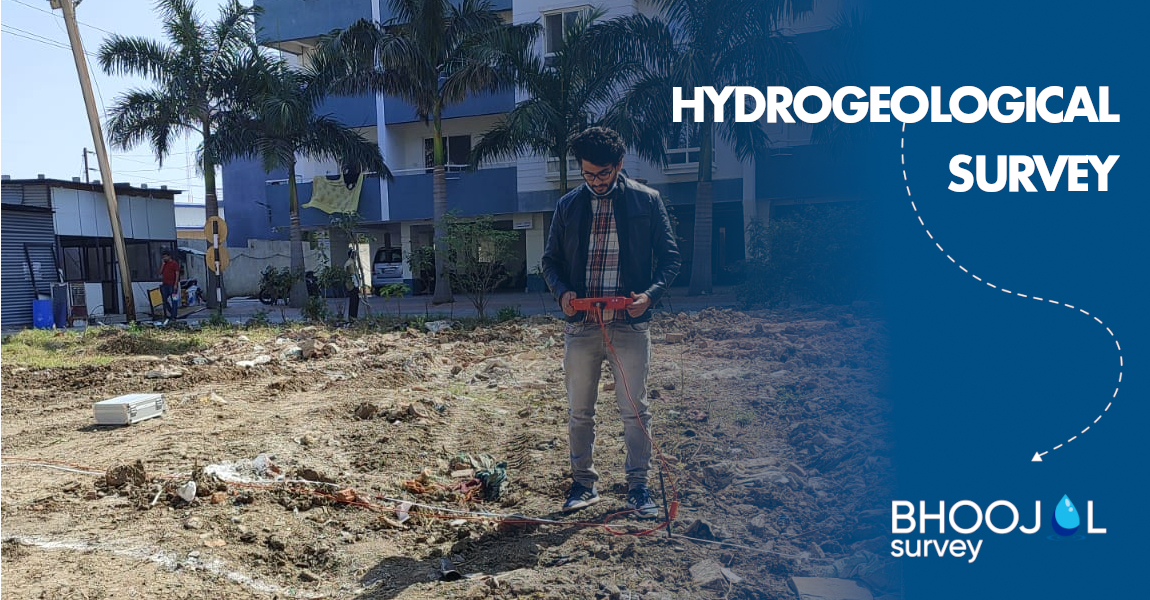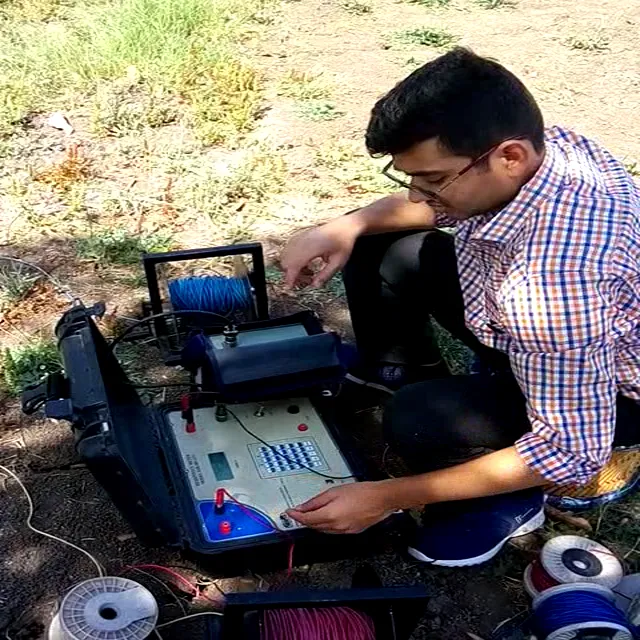Hydrogeological Survey: A Complete Guide
Watch our Hydrogeological Survey Guide
Water beneath the ground is hidden but vital. Every factory, every farm, and every city depends on groundwater for survival. But drilling a borewell blindly is like gambling with lakhs of rupees. Will you strike water, or will your drill go 500 feet deep into dry rock? This is where a professional Hydrogeological Survey becomes your scientific advantage.
At Bhoojal Survey, we believe that understanding the underground world saves millions of rupees and ensures sustainable water supply for decades. In this comprehensive guide, we will explain everything you need to know about a Hydrogeological Survey in simple language. We will cover what it is, why it is absolutely critical, how we conduct it scientifically, and why your project's water security depends on it.
1. What is a Hydrogeological Survey?
To put it simply, a Hydrogeological Survey is the detailed scientific study of groundwater. It involves analyzing the geology beneath your land and mapping exactly where water exists underground, how much water is available, and how that water moves through rock and soil layers.
Many people get confused between "Hydrology" and "Hydrogeology." Let's clear that up first:
- Hydrology is about water above the ground (rain, rivers, lakes, streams, and floods).
- Hydrogeology is about water under the ground (groundwater, borewells, aquifers, water tables).
When we conduct a detailed Hydrogeological Survey, we are basically trying to answer three critical questions for your site:
- Location: Where exactly is the groundwater located beneath your land?
- Quantity: How much water is available? Will it be enough for your needs?
- Quality: Is the water safe for drinking, or is it contaminated with salts and chemicals?
By answering these questions scientifically, the Hydrogeological Survey helps you drill borewells at the right location, at the right depth, ensuring success and avoiding expensive dry borewells.

2. Why is a Hydrogeological Survey So Important?
Imagine you invest ₹10 lakhs to build a new factory. You need water for your operations. Without conducting proper research, you hire a local driller who drills a 400-foot deep borewell based on "experience and intuition." After spending ₹2 lakhs on drilling, you get only 2 liters per minute of water—barely enough to run a bathroom tap, let alone a factory. The borewell fails. You drill another one. That also fails. Your investment is wasted, and your factory opening is delayed by months.
This nightmare scenario happens every day across India. Here is why conducting a Hydrogeological Survey before drilling is absolutely critical:
A. Preventing Failed Borewells
Groundwater doesn't exist uniformly everywhere underground. It flows through cracks in rocks (called fractures) and porous soil layers (called aquifers). A Hydrogeological Survey uses scientific equipment to locate these exact water-bearing zones. Without a survey, drilling is pure guesswork. With a survey, drilling becomes precision engineering with 80-90% success rates.
B. Saving Massive Amounts of Money
A single borewell in hard rock areas can cost ₹1.5 to ₹3 lakhs. If you drill three unsuccessful borewells based on guesswork, that's ₹9 lakhs wasted. A professional Hydrogeological Survey costs only ₹50,000 to ₹1.5 lakhs depending on site size, and it virtually guarantees your first borewell succeeds. The return on investment is obvious—spending ₹1 lakh on a survey saves you from wasting ₹9 lakhs on failed drilling.
C. Understanding Water Sustainability
It's not just about finding water once; it's about ensuring that water source will last for 20-30 years. A comprehensive Hydrogeological Survey calculates the "recharge rate"—how fast the groundwater refills naturally after you pump it out. This prevents the common problem where a borewell works great for two years, then suddenly dries up because you've depleted the aquifer faster than nature can refill it.
D. Government and Environmental Compliance
In India, large industries extracting significant groundwater need permission from the Central Ground Water Board (CGWB) or State Ground Water Authorities. They require a detailed Hydrogeological Report showing that your extraction won't harm the regional water table or affect neighboring farmers' wells. Without this compliance report, your industry cannot legally operate.
3. Who Needs a Hydrogeological Survey?
Almost every project that depends on groundwater for its operations needs a professional Hydrogeological Survey. Here are the main sectors we serve:
Industrial Manufacturing Units
Factories need massive amounts of water—for cooling machinery, washing products, or as a raw material in production processes like pharmaceuticals, textiles, and food processing.
The Risk: Setting up an entire factory worth crores, only to discover there's insufficient groundwater to run your operations.
The Solution: A Hydrogeological Survey before land purchase tells you exactly how many borewells you'll need and whether the site can support your water requirements for decades.
Agricultural and Irrigation Projects
Farmers invest heavily in drip irrigation systems, greenhouses, and high-value crops. All of this depends on reliable groundwater supply throughout the year.
The Risk: Spending lakhs on irrigation infrastructure, only to have your borewell dry up in summer when crops need water most desperately.
The Solution: Our survey identifies the best aquifer zones and tells you the sustainable pumping limits to ensure year-round water availability without depleting the aquifer.
Real Estate Developers and Townships
When building residential colonies or commercial complexes, developers need to ensure adequate water supply for hundreds or thousands of future residents.
The Risk: Selling flats promising 24/7 water supply, then facing angry residents when borewells fail during summer, damaging your reputation and leading to legal disputes.
The Solution: A comprehensive Hydrogeological Survey helps plan how many borewells the township needs, where to drill them, and whether artificial recharge systems (like recharge wells) are necessary to maintain supply.

4. The Step-by-Step Process: How We Do It
At Bhoojal Survey, we follow a systematic scientific approach for every Hydrogeological Survey project. It's not about magic sticks or guesswork; it's about data, technology, and geological expertise. Here is our proven process:
Step 1: Desktop Study and Secondary Data Collection
Before visiting your site, we conduct extensive research. We study geological maps published by the Geological Survey of India (GSI). We review existing borewell data from nearby areas. We analyze satellite imagery to understand the rock formations and lineaments (underground fractures visible from space where water accumulates). We collect rainfall data and groundwater level data from the Central Ground Water Board.
Step 2: Detailed Site Reconnaissance
Our geologists visit your site for ground truthing. We study the exposed rock formations, looking at rock types—whether it's granite, basalt, sandstone, or limestone—because each rock type stores and transmits water differently. We map existing borewells in the vicinity and interview their owners about depth, water yield, and seasonal variations. We look for natural indicators like vegetation patterns (certain trees only grow where groundwater is near the surface).
Step 3: Geophysical Survey Using Advanced Equipment
This is where science truly shines. We deploy specialized geophysical instruments that "see" underground without digging:
Electrical Resistivity Survey: We inject electrical current into the ground and measure resistance. Water-bearing zones conduct electricity better than dry rock, creating distinctive signatures on our graphs.
Ground Penetrating Radar (GPR): Similar to medical ultrasound, this sends electromagnetic waves underground, creating images of subsurface layers and fractures where water accumulates.
Seismic Refraction: We measure how shock waves travel through different underground layers, helping identify porous aquifer zones versus solid impermeable rock.
Step 4: Aquifer Mapping and Interpretation
Our hydrogeologists analyze all collected data to create detailed cross-sectional diagrams showing the underground geology layer by layer. We identify primary aquifers (main water storage zones), secondary aquifers (backup zones), and confining layers (impermeable rock that traps water). We mark the precise locations with the highest probability of striking abundant groundwater.
Step 5: Water Quality Assessment
If existing borewells are present nearby, we collect water samples and send them to certified laboratories. We test for Total Dissolved Solids (TDS), fluoride, arsenic, nitrates, hardness, pH, and other parameters. This ensures the groundwater quality meets drinking water standards or identifies if treatment systems will be needed.
Step 6: The Comprehensive Report
Finally, we compile everything into a detailed Hydrogeological Survey report. This report includes geological maps, geophysical survey results, recommended borewell locations marked with GPS coordinates, advised drilling depth, expected water yield (in liters per minute), water quality analysis, and most importantly—a sustainability assessment telling you how much water you can safely extract annually without depleting the aquifer.
5. The Role of Technology in Modern Hydrogeological Surveys
Fifty years ago, groundwater surveys relied heavily on personal experience and water divining rods (a pseudoscientific method). Today, Hydrogeological Surveys are precise sciences backed by cutting-edge technology:
- Remote Sensing and Satellite Imagery: NASA and ISRO satellites equipped with specialized sensors can detect underground water signatures from space. We analyze this data to identify large-scale geological features and lineaments invisible to the naked eye.
- GIS (Geographic Information Systems): We create digital 3D models of your site's geology. This software integrates satellite data, ground surveys, and historical borewell data, allowing us to visualize and analyze the subsurface in ways impossible before.
- Automated Data Loggers: We install sensors in existing borewells that continuously monitor water levels and transmit data wirelessly. This real-time monitoring reveals how the aquifer responds to seasonal changes and pumping stress.
- Hydrochemical Analysis: Advanced laboratory equipment can detect contaminants at parts-per-billion levels, ensuring your groundwater meets the strictest safety standards.
6. Why Choose Bhoojal Survey?
You might find other providers of Hydrogeological Survey services, but here is why Bhoojal Survey is the preferred choice for India's leading corporations and government agencies:
1. Decades of Geological Expertise: Our team includes licensed geologists and hydrogeologists with advanced degrees (M.Sc., Ph.D.) and extensive fieldwork experience across India's diverse geological terrains—from hard rock Deccan plateau to alluvial Indo-Gangetic plains to coastal aquifers.
2. State-of-the-Art Equipment: We invest heavily in the latest geophysical survey instruments imported from leading global manufacturers. Our equipment is regularly calibrated and maintained to ensure the highest accuracy in subsurface imaging.
3. Proven Track Record: We've successfully completed over 500+ Hydrogeological Survey projects for clients ranging from NTPC and Coal India to Adani Group and Infosys. Our borewell success rate exceeds 85%, far above the industry average of 40-50% for non-surveyed drilling.
4. Comprehensive Solutions: We don't just hand you a report and disappear. We provide drilling supervision, pump selection guidance, water treatment system design, and long-term aquifer management plans. We're your complete groundwater consultants from survey to sustainable extraction.
5. Fast and Efficient: We understand project timelines are critical. Our streamlined processes deliver detailed survey reports within 10-15 days without compromising quality, so your construction schedule stays on track.
7. Frequently Asked Questions (FAQ)
Q1: How long does a Hydrogeological Survey take?
For a typical industrial site (10-50 acres), fieldwork takes 3-5 days. Data processing, laboratory analysis, and report preparation take another 7-10 days. You'll receive your comprehensive report within approximately 2 weeks from survey commencement.
Q2: My neighbor has a working borewell. Does my land automatically have good groundwater?
Not necessarily! Groundwater exists in fractures and aquifers that can vary dramatically over short distances. Your neighbor's borewell might have accidentally hit a major fracture zone, while drilling 100 meters away could hit solid impermeable rock. A Hydrogeological Survey scientifically locates the best zones on YOUR specific land.
Q3: Is this survey required for government approvals?
For industries extracting substantial groundwater (generally above 10,000 liters per day), the Central Ground Water Authority (CGWA) requires a detailed Hydrogeological Report for obtaining No Objection Certificates (NOC). Without this, you cannot legally operate your extraction borewells.
Q4: Can you conduct surveys in hilly or difficult terrains?
Absolutely. Our geophysical equipment and experienced field teams can work in challenging terrains including hills, forests, and rocky outcrops. We've successfully conducted surveys in the Western Ghats, Himalayan foothills, and remote Deccan plateau locations.
Q5: What is the cost of a Hydrogeological Survey?
Costs vary based on site size, terrain complexity, and survey methods employed. Typically, surveys range from ₹50,000 for small residential plots to ₹2-3 lakhs for large industrial sites requiring extensive geophysical investigations. Remember, this investment prevents waste of ₹5-10 lakhs on failed borewells.
Conclusion
Groundwater is India's invisible wealth—the lifeline for agriculture, industry, and drinking water. But this resource is finite and fragile. A Hydrogeological Survey is not just a technical report; it's your roadmap to water security. It's the scientific foundation ensuring your factory runs smoothly, your crops flourish, and your community thrives, even during the harshest summers.
Don't gamble with groundwater. Don't waste money on failed borewells based on guesswork. Contact Bhoojal Survey today for a scientifically rigorous Hydrogeological Survey, and let us help you unlock the hidden water wealth beneath your land with precision, sustainability, and guaranteed success.












